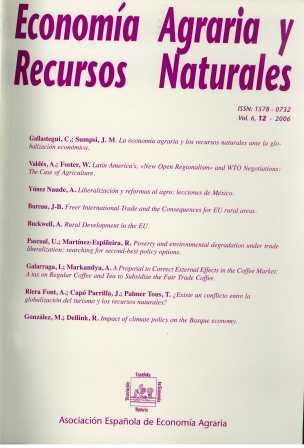Liberalization and reform of the agricultural sector: Lessons from Mexico
Keywords:
Efectos de los acuerdos de liberalización. México. Políticas públicas.Abstract
In this article I examine the North Atlantic Free Trade Agreement (NAFTA) to investigate its impact on agriculture and the rural economy in Mexico and assess the policies the country has adopted to support the process. The first conclusion is that NAFTAhas confirmed some predictions (an increase in the trading of agricultural and fresh fish products between member countries and price cuts to Mexican producers of non-competitive crops). The second conclusion is the non-fulfilment of other predictions, an important one of which was an increase in the production of Mexican maize —the country’s main crop and form of human sustenance, and considered non-competitive. The Mexican experience, however, shows that the polarized view of some political agents, which is reflected in their choice of public policies, has led to contradictions between goals and policies, that is, the protection of food safety and sovereignty in the context of an agricultural trade liberalization framework. The article concludes by indicating some of the lessons the Mexican experience has to offer to other Latin American countries with existing or pending free trade agreements.Downloads
Published
2011-10-17
Issue
Section
Articles
License
Assignment of publishing rights for accepted manuscripts: Authors will assign to the Spanish Association of Agricultural Economics (Asociación Española de Economía Agraria, AEEA) the copyright of the manuscript and any supplemental tables, illustrations or other information submitted therewith that are intended for publication as part of or as a supplement to the manuscript in all forms and media (whether now known or hereafter developed), throughout the world, in all languages, for the full term of copyright, effective when and if the article is accepted for publication. No revisions, additional terms or addenda to this Agreement can be accepted without our express written consent.

